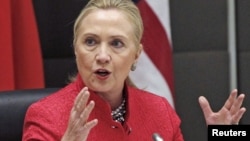PRETORIA — U.S. Secretary of State Hillary Clinton said the defection of the Syrian prime minister and other officials, as well as escalating fighting around Aleppo, make it "urgent" to plan for what comes once the regime of Bashar al-Assad falls.
Clinton, who stopped in Pretoria, South Africa, as part of a 10-day tour of Africa, said the days of the regime of Syrian President Bashar al-Assad, are numbered, and the priority now is to end the bloodshed and prepare the political transition.
"The intensity of the fighting in Aleppo, the defections really point out how imperative it is that we come together and work toward a good transition plan," said Clinton. "We can begin talking about and planning for what happens next, the day after the regime does fall. I'm not going to put a timeline on it. I can't possibly predict it, but I know it's going to happen as do most observers around the world."
Clinton issued warnings to both the rebels and the government.
"We have to make sure the state institutions stay intact. We have to make sure that we send very clear expectations about avoiding sectarian warfare," said Clinton. "Those who are attempting to exploit the misery of the Syrian people either by sending in proxies or sending in terrorist fighters must recognize that that will not be tolerated first and foremost by the Syrian people.
The secretary spoke in Pretoria as part of the second annual U.S.-South Africa Strategic Dialogue, where the secretary was expected to push for South Africa's support on the United Nations Security Council to deal with the deepening crisis in Syria.
South Africa abstained from voting on a third effort by the U.N. Security Council to pass a resolution that would have held President Assad responsible for his failure to abide by peace envoy Kofi Annan's peace plan and threatened him with sanctions. South Africa's abstention effectively backed Russia and China's veto.
South Africa said the resolution was biased in favor of the rebels.
South African foreign minister, Maite Nkoana-Mashabane, said Tuesday the country's position remains unchanged.
"The sooner we quicken our steps as the international community to support these people of Syria, the better," said Nkoana-Mashabane. "But nothing will ever take the place of the Syrians themselves coming up with a "Made in Syria" solution to their problem, supported by the international community."
Clinton stressed the need for international cooperation to meet the "desperate humanitarian needs" of those caught in the violence as well as those who have fled during what she called this "very difficult time for the people of Syria."
Clinton, who stopped in Pretoria, South Africa, as part of a 10-day tour of Africa, said the days of the regime of Syrian President Bashar al-Assad, are numbered, and the priority now is to end the bloodshed and prepare the political transition.
"The intensity of the fighting in Aleppo, the defections really point out how imperative it is that we come together and work toward a good transition plan," said Clinton. "We can begin talking about and planning for what happens next, the day after the regime does fall. I'm not going to put a timeline on it. I can't possibly predict it, but I know it's going to happen as do most observers around the world."
Clinton issued warnings to both the rebels and the government.
"We have to make sure the state institutions stay intact. We have to make sure that we send very clear expectations about avoiding sectarian warfare," said Clinton. "Those who are attempting to exploit the misery of the Syrian people either by sending in proxies or sending in terrorist fighters must recognize that that will not be tolerated first and foremost by the Syrian people.
The secretary spoke in Pretoria as part of the second annual U.S.-South Africa Strategic Dialogue, where the secretary was expected to push for South Africa's support on the United Nations Security Council to deal with the deepening crisis in Syria.
South Africa abstained from voting on a third effort by the U.N. Security Council to pass a resolution that would have held President Assad responsible for his failure to abide by peace envoy Kofi Annan's peace plan and threatened him with sanctions. South Africa's abstention effectively backed Russia and China's veto.
South Africa said the resolution was biased in favor of the rebels.
South African foreign minister, Maite Nkoana-Mashabane, said Tuesday the country's position remains unchanged.
"The sooner we quicken our steps as the international community to support these people of Syria, the better," said Nkoana-Mashabane. "But nothing will ever take the place of the Syrians themselves coming up with a "Made in Syria" solution to their problem, supported by the international community."
Clinton stressed the need for international cooperation to meet the "desperate humanitarian needs" of those caught in the violence as well as those who have fled during what she called this "very difficult time for the people of Syria."




